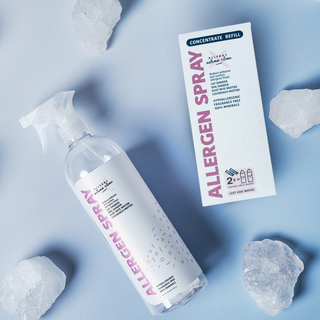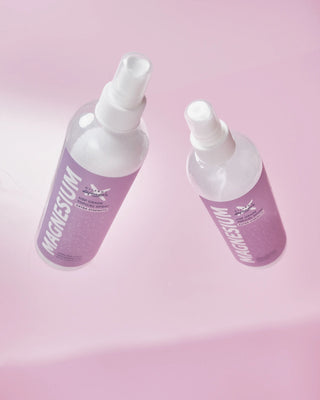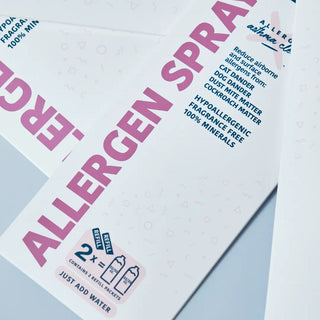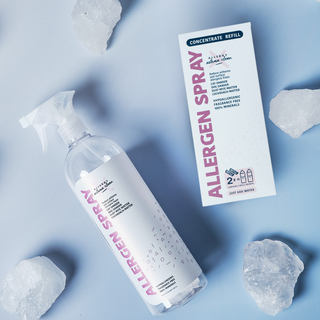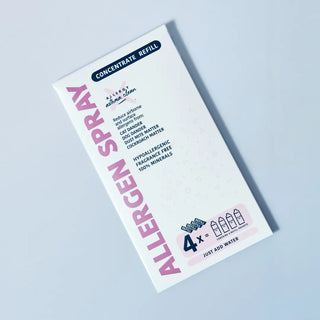

Calling all cat allergy sufferers
How to Get Rid of Cat Allergies Naturally
Tips, tricks and new product backed by powerful science
If you’re like me, your love for furry friends runs deep, but your allergies can make spending time with your beloved cat feel impossible. At Allergy Defender, we believe in powerful, natural solutions that let you enjoy your home—and your pets—without the sneezing, itchy eyes, or stuffy nose that often come with it.

Allergies to Cats and Cat Allergens
What causes cat allergies? Cat allergies are triggered by the body's immune system overreacting to proteins found in a cat's saliva, urine, and dander (tiny flecks of skin shed by cats). The primary culprit behind cat allergies is a protein called Fel d 1, which is produced by the sebaceous glands in a cat's skin. As cats groom themselves, this protein gets deposited onto their fur and subsequently becomes airborne as small particles, easily inhaled by susceptible individuals. “Allergies to cats are the most common animal‐origin allergy, and affect approximately 1 in 5 adults worldwide".1
The prevalence of allergy to furry animals has been increasing, and allergies to cats are a major risk factor for the development of asthma and rhinitis.
All cats produce Fel d 1 regardless of breed, age, hair length, sex, housing (indoors vs outdoors), or body weight; there are no allergen‐free or hypoallergenic cats.”1
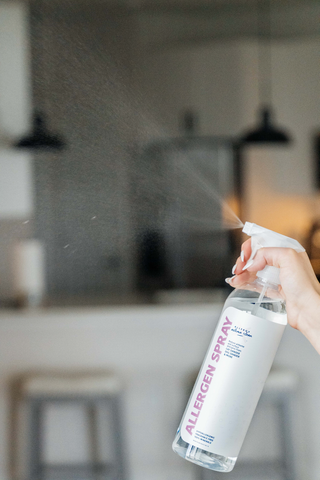
Natural Remedies for Cat Allergies
If you're looking to manage cat allergies without relying solely on medications, natural remedies can offer additional approaches to alleviate symptoms and improve your overall well-being.
Allergen Spray For Full Control: Allergen Spay effectively neutralizes cat dander allergens in the air and on surfaces throughout your home without the need for pills or shots. Backed by real science and loved by thousands of customers looking to relieve cat allergies naturally.
Vitamin Supplements to Boost the Immune System: A strong immune system can help your body better tolerate allergens. Consider incorporating immune-boosting vitamins and minerals into your diet, such as vitamin C, vitamin D, and zinc. These nutrients can support your body's defense mechanisms and potentially reduce the severity of allergic reactions.
Herbal Remedies and Supplements: Certain herbs and supplements have shown promise in alleviating allergy symptoms. Butterbur extract, quercetin, and stinging nettle are among the natural remedies that may help reduce inflammation and histamine release. Always consult with a healthcare professional before trying any new supplements, as they may interact with other medications.
Neti Pot: A neti pot can be a useful tool to clear your nasal passages of allergens and irritants. By flushing out your sinuses with a saline solution, you can reduce congestion and alleviate allergy symptoms. Use distilled or sterile water when using a neti pot to avoid introducing harmful bacteria into your nasal passages.
Improving Indoor Air Quality
Proper ventilation ensures the circulation of fresh air and to prevent the buildup of indoor allergens. When weather permits, open windows and doors to allow for natural airflow.
A. Other Methods to Reduce Cat Allergens: Beyond using Allergen Spray, and air purifiers, several additional measures can reduce cat allergens in your home:
- Regularly change air filters: Replace air filters in your HVAC system according to the manufacturer's recommendations to prevent cat dander from recirculating.
- Control humidity levels: Maintain humidity levels between 30% and 50%.
- Clean air ducts: Have your air ducts professionally cleaned to remove accumulated dust, dander, and other allergens.
- Avoid smoking indoors: Smoking indoors releases harmful chemicals. It can also worsen respiratory symptoms, including cat allergies.
B. Minimize Allergens on Surfaces: Regularly clean surfaces and objects in your home to reduce cat allergens. Use a damp cloth when dusting to prevent allergens from becoming airborne. Consider using a microfiber cloth and Allergen Spray together, as they are effective at trapping and holding onto allergens and not releasing them back into the air.

Cat Allergy Medicines and Treatments
Over-the-CounterAntihistamines: Over-the-counter (OTC) antihistamines are readily available and can be effective in reducing allergic symptoms caused by cat allergens. Antihistamines work by blocking the histamine receptors in the body, thereby reducing sneezing, itching, and runny nose.
Prescription Medications for Severe Allergies: For individuals with more severe cat allergies, a healthcare provider may recommend stronger prescription medications. These may include prescription-strength antihistamines, nasal corticosteroids, or combination medications that combine an antihistamine with a decongestant. Corticosteroid nasal sprays can help reduce inflammation in the nasal passages, providing relief from congestion and sneezing.
Immunotherapy and Allergy Shots: Immunotherapy, commonly known as allergy shots, is a long-term treatment option for cat allergies. It involves administering regular injections of small amounts of cat allergens under the skin to desensitize the immune system. Over time, the body becomes less reactive to cat allergens, leading to a reduction in allergy symptoms. Immunotherapy is typically reserved for individuals with significant cat allergies that don't respond well to other treatments.
Long-Term Solutions for Cat Allergy Sufferers
A. Use Allergen Spray: An immediate and natural way to achieve indoor allergy relief the natural way. Savanna Elliott, the co-founder of Allergy Defender has been using Allergen Spray for over 20+ years to help combat her pet allergies. Now, she owns a few cats and uses Allergen Spray first thing in the morning and right before bed.
B. Create an Allergy-Friendly Home: In addition to regular cleaning, invest in allergen-proof covers for your bedding, and keep cats off furniture and bedding (we know this will be hard to do!) Designate cat-free zones in your home. These measures can help minimize allergen exposure and create an allergy-friendly environment for you to live comfortably with your feline companion.
C. Groom Your Cat: Regularly groom your cat to reduce the amount of loose fur and dander in your living space. Brushing your cat outdoors can help minimize the distribution of allergens indoors. Consider enlisting the help of a non-allergic family member or a professional groomer for cat grooming tasks.
Living with cat allergies doesn't have to mean sacrificing your love for feline companionship. By adopting a holistic approach that combines natural remedies, lifestyle adjustments, and medical interventions, you can effectively manage cat allergies and create a harmonious environment for you and your furry friend.
1 Source: https://www.ncbi.nlm.nih.gov/pmc/articles/PMC7156987/
Defend Your Health
Allergy defense that's safe for people, pets & the planet
Articles

Choosing the Right Nasal Spray for Your Needs
Many nasal sprays—especially decongestant sprays like oxymetazoline (Afrin) or phenylephrine—are only meant to be used for 3 consecutive days. Why

Natural Alternatives to Prednisone for Allergies
If you’re among the millions dealing with chronic inflammatory conditions like allergic rhinitis, seasonal allergies, or atopic dermatitis, you’re likely wondering whether natural alternatives can provide relief without the concerning...

